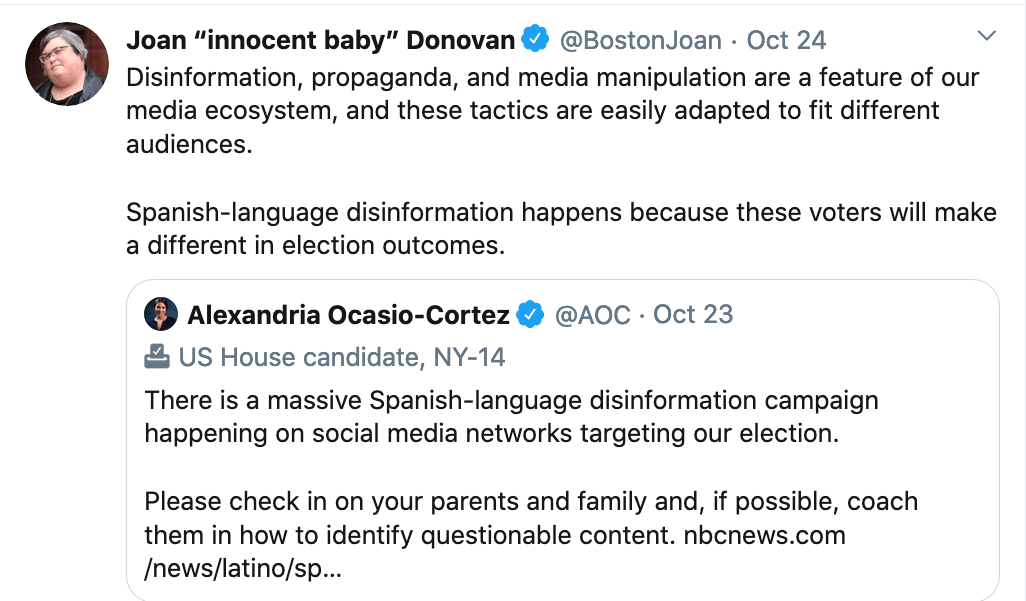The Spanish-Language Disinformation Dilemma

“Disinformation, propaganda, and media manipulation are a feature of our media ecosystem, and these tactics are easily adapted to fit different audiences. Spanish-language disinformation happens because these voters will make a differen[ce] in election outcomes.” — Joan Donovan

As the 2020 presidential election comes to a close, the United States is struggling with a pandemic layered on top of an “information crisis caused by the spread of viral disinformation.”
Social-media platforms have recently made changes to their policies and taken enforcement actions ahead of the election to reduce content that undermines the democratic process. But these companies aren’t replicating these efforts to tackle the spread of the same content in Spanish — a major problem that seriously threatens the health, safety and civil rights of the Latinx community.
Language itself should not be a barrier to battling disinformation. Latinx people are not a monolithic voting bloc, yet they are being targeted across the entire spectrum of media: from radio to newspapers to social media — and even in encrypted messaging apps like WhatsApp.
This isn’t a new phenomenon
The platforms have long shown a blatant indifference to disinformation aimed at marginalized communities. In 2016, Russian operatives targeted Black and Latinx people on Facebook with ads to “inflame race-related tensions” intended to undermine democracy and suppress voter turnout. As British outlet Channel 4 News revealed, the 2016 Trump campaign used tactics to deter voter turnout, categorizing 3.5 million Black voters as “deterrent” — voters that the campaign wanted to stay home.
This time is no different, and in fact may be even worse.
‘Disinformation, conspiracy theories and lies’
Latinx Democratic strategist Evelyn Pérez-Verdia told NiemanLab that she had “never seen this level of disinformation, conspiracy theories and lies … It looks as if it has to be coordinated.”
Though the exact origins of this content have yet to be determined, one New York City gamer saw an “opportunity” in the apparent lack of Spanish-language content. The individual created a network of websites and Facebook pages to spread disinformation in Spanish — and profited off of these lies. Many of these pages, if not all, are no longer operational. Yet searching for the names of the websites on Facebook still leads to problematic content — a series of racist and anti-Muslim posts in Spanish.
Two years ago, the Change the Terms coalition, which Free Press co-founded, provided a set of guidelines for online platforms to tackle hate. The set of model policies includes better enforcement and transparency measures — as well as regular audits of algorithms to ensure that companies are protecting the speech of historically oppressed communities while preventing white supremacists from using platforms to recruit, organize and disseminate their hateful ideologies.
The recommendations also provide guidance on ways to tackle disinformation. These measures couldn’t be more crucial: Much online disinformation is created and shared to drive communities apart or suppress voting by using content that invokes fear and hate.
Platforms can’t just announce another policy change to solve these problems — they need to adopt these policies and enforce them by providing adequate support and culturally relevant training to content moderators. But right now the platforms, particularly Facebook, are still prioritizing engagement over the safety of our communities — and treating voter suppression as collateral damage. The platforms must live up to their repeated promises that they will protect marginalized people and consider the real-world impacts of their policy and product changes.
Online companies have the power, technology and resources to stop bad actors from weaponizing their platforms to target marginalized communities. It’s past time for these corporations to change the terms and tackle the spread of deceitful content in all languages.